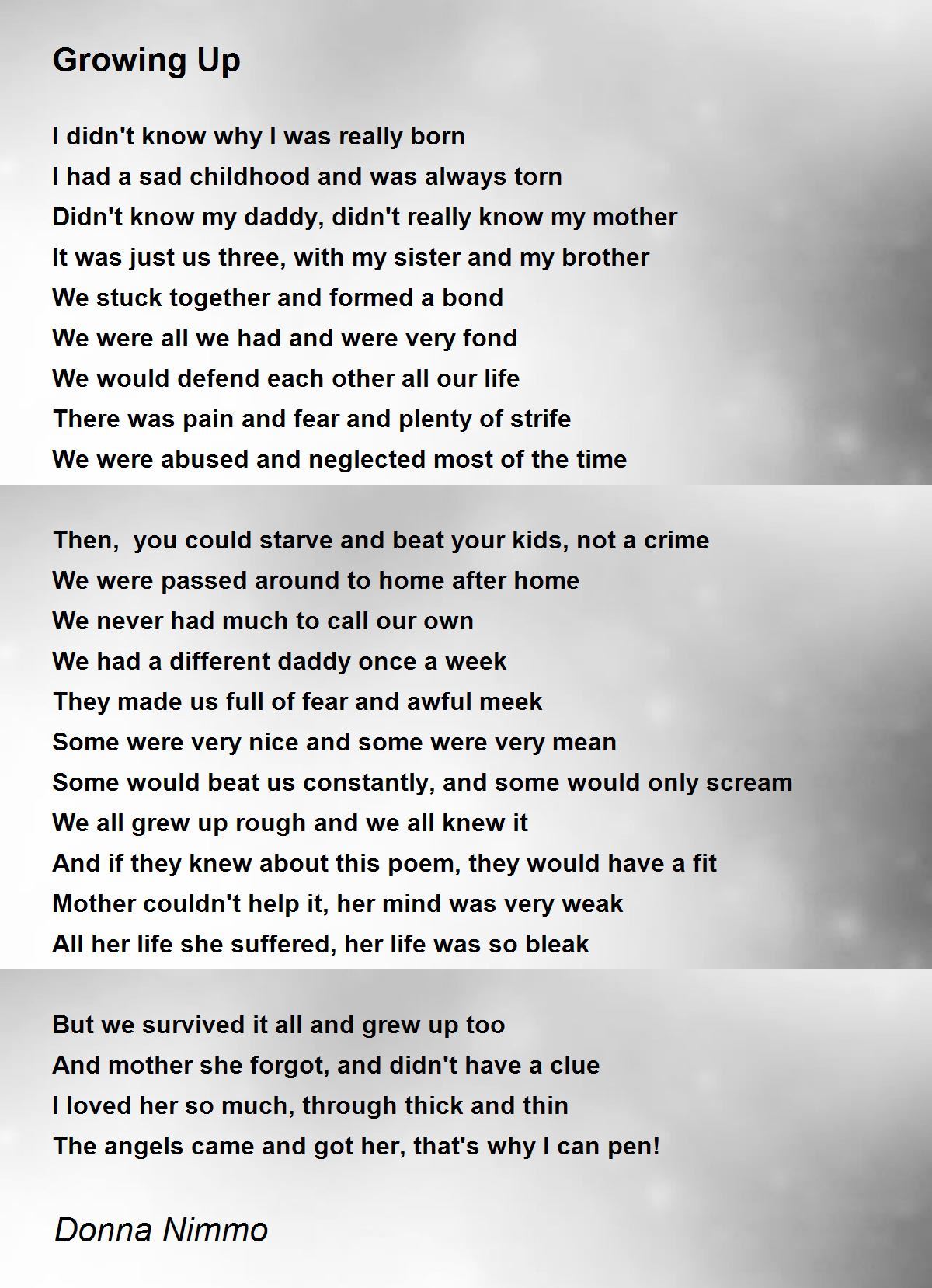
Happy those early days! when I Shined in my angel infancy. You’ll love these poems since they have been written by famous poets. We discuss this poem at greater length in a separate post.In the first category, we are going to look at some of the most famous poems about growing up.
#SAD POEMS ABOUT GROWING UP HOW TO#
Published in 1974, it describes a secret other world which lies between the sidewalk and the street: a world which children know how to find, where things are somewhat different from our world.Ĭhalk arrows children have drawn on the sidewalk direct other would-be travellers to this enchanted land – a land where the wind is as cool and fresh as peppermint, and the mysterious ‘moon-bird’ resides. Indeed, this is probably the best-known of all of Shel Silverstein’s poems. Where better to conclude this pick of the greatest Shel Silverstein poems than where the sidewalk ends, that magic, hidden space between the path and the road? They effectively fly up past the treetops and the mountains and high into the sky, until they grow dizzy and … well, in a way that recalls Ogden Nash, there’s some more clever wordplay in the closing line.

Here we find the usual order of things inverted in a fun and exciting way: the poem begins normally enough with the speaker tripping over their shoelace, but then they fall upwards instead of down. This short poem also gives its name to one of Silverstein’s poetry collections. As ever with Silverstein, these range from the usual and expected (crawling around in the dirt) to the downright outlandish (finding a lost silver mine).

It contains two speakers: the first (an adult) asks the child how they came to end up with such a dirty face, and the child lists all the things they have been up to. Some of Silverstein’s most celebrated poems are about the playful mischievousness of young children played off against the strict and joyless finger-wagging of adults (parents, teachers). The book the poem gives its name to is one of Silverstein’s biggest-selling works and has attracted a range of critical interpretations: some critics and reviewers regard it as a religious parable, while others view it as carrying an environmentalist message. The boy, in return, loved the tree, but as he grew up, he spent more and more time away from the tree, but whenever he returned, the tree always did her best to provide the boy with what he desired: apples to sell for money, for instance. It’s a narrative poem about a (female) tree which loved a little boy. One of the longer poems on this list, ‘The Giving Tree’ is also one of Silverstein’s most beloved. Was there ever a better light children’s poem about anxiety and worry than this one? Many of us entertain self-doubt from time to time, and Silverstein’s talent here was to give these doubts concrete form: these ‘whatifs’ crawl into the speaker’s ear like insects, and become the tangible manifestation of those ‘voices in the head’ so many of us have heard which eat away at our happiness and self-confidence. The rhythm of this poem, and the list-like structure – recalls Dorothy Parker’s light verse, but the poem is quintessential Shel Silverstein. Some of his complaints are understandable and relatable – the ground being too dusty, for instance, or his shoes being too tight – while others reveal him to be a complete misery-guts: complaining that other people are too happy, for example (no chance of that with Mr Grumpledump himself!), or that clouds are too fluffy. Everything is wrong, because everything in the world is ‘too’ something: days are too long, the sunshine is too hot for him, and the moon is too high. Mr Grumpledump, as his name perhaps suggests, hates everything – or at least, seems to.


 0 kommentar(er)
0 kommentar(er)
